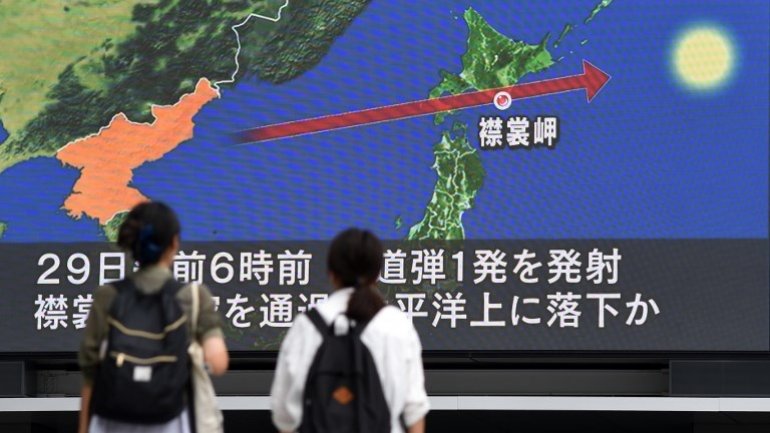North Korea fires missile over Japan in 'unprecedented threat'
 foto: Pedestrians watch the news on a huge screen displaying a map of Japan (R) and the Korean Peninsula, in Tokyo on August 29, following a North Korean missile test that passed over Japan.
foto: Pedestrians watch the news on a huge screen displaying a map of Japan (R) and the Korean Peninsula, in Tokyo on August 29, following a North Korean missile test that passed over Japan.
North Korea has fired a missile over northern Japan in a move Japanese Prime Minister Shinzo Abe called an "unprecedented" threat to his country.
The missile, launched early on Tuesday Korean time, flew over Hokkaido island before crashing into the sea.
The UN Security Council is expected to hold an emergency meeting in response.
North Korea has conducted a flurry of missile tests recently, but this is the first time it has fired what is thought to be a ballistic weapon over Japan.
On the two previous occasions its rockets crossed Japan - in 1998 and 2009 - North Korea said they were for satellite launch vehicles, not weapons.
The BBC's Rupert Wingfield-Hayes in Tokyo says this latest launch appears to be the first of a missile powerful enough to potentially carry a nuclear warhead.
The South Korean military said the missile was fired eastward just before 06:00 local time (21:00 GMT) from near the North's capital, Pyongyang - which is rare.
Early analysis of the launch suggests the missile:
- flew a distance of more than 2,700km (1,678 miles)
- was likely to have been a Hwasong-12, a newly developed intermediate range weapon
- reached a maximum altitude of about 550km (342 miles), lower than most previous North Korean tests
- fell into the North Pacific Ocean 1,180km off the Japanese coast after breaking into three pieces
No effort was made by Japan to shoot down the missile but it issued a safety warning telling citizens in Hokkaido to take shelter in "a sturdy building or basement".
US and Japanese forces have just finished a joint drill in Hokkaido while another annual military exercise involving tens of thousands of South Korean and US soldiers is still under way in South Korea.
The North sees these regular military drills involving the US as highly provocative, perceiving them as a rehearsal for an invasion.
South Korean President Moon Jae-in ordered a show of "overwhelming" force in response to the launch. Four South Korean jets staged a live bombing exercise on Tuesday.
Mr Abe said he had spoken to US President Donald Trump and that both agreed to increase pressure on North Korea. The Pentagon meanwhile said the launch did not represent a threat to the US itself but that the military was working to gather more intelligence about it.
China warned that tensions on the Korean peninsula had reached a "tipping point" but said the US and South Korea were partly to blame. Foreign ministry spokeswoman Hua Chunying criticised the two countries for their repeated military drills putting pressure on the North.
"After so many rounds and vicious cycles, do they feel they are nearer to peaceful settlement of the issue?" he said, adding that pressure and sanctions would not solve the problem.
Russia's Deputy Foreign Minister Sergei Ryabkov said the country was "extremely worried" about the "tendency towards an escalation" but also suggested the US-South Korean military exercises "played a role in provoking Pyongyang".
Read more BBC
- North Korea fires anti-ship missiles, says South Korea
- North Korea sets free American student who's in coma
- American student released from North Korea prison is reportedly in a coma
- Otto Warmbier: US doctors dispute N Korean coma story
- North Korea: Diplomatic delegation 'mugged' at JFK Airport
- Ukraine denies selling missile technology to North Korea